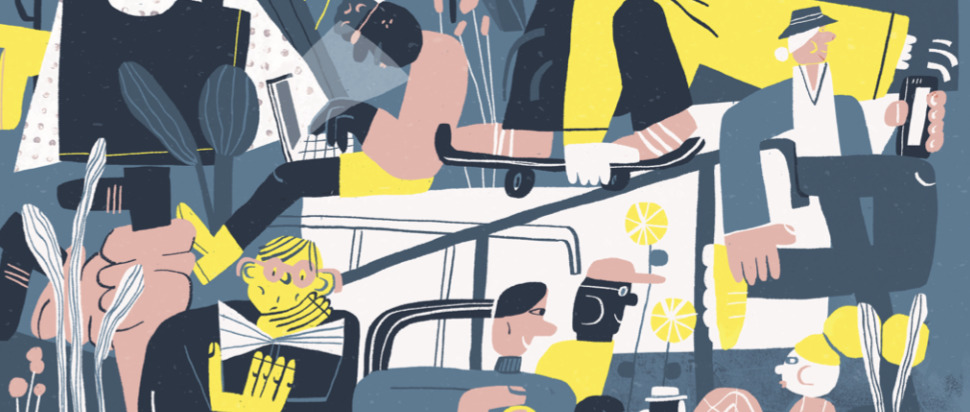Seasonal Survival: Mental health at university
University is tough: your flat is probably cold, meeting new people is scary, and you have an actual degree to get. One writer reflects on keeping your mental health in check year round – through the dark times, and the light
Something they leave out of the open days is that, despite university offering tremendous excitement and inspiration, experiencing all this is reliant on the cooperation of the world around you. If you explode with enthusiasm with some of your reading, you might resent the limitations of the course’s scope. If you fall in love with a sport or creative activity, you may struggle with the many social demands that come with it.
And if you want to throw yourself into a new city, you’ll have to deal with the inhospitality of its climate. It seems like a tired cliché, but the fluctuations of weather in Scottish cities could be responsible for not feeling like your university experience is working.
Once you get over the buzz of freshers, or the stress of midterms clashing with your first university Halloween, you get hit by a climate that promises only to worsen the closer you get to the year’s end. November, without Christmas cheer or the panic of December exams, can stretch on in an endless grey fog; less light and warmth and outdoor activities severely limits socialising, and going to and from places after 4pm suddenly becomes less viable or safe.
Saying to watch out for feeling sad when the weather gets bad does sound like it misses the nuance of mental health issues at university. But like many things in student life (or adult life, fullstop) it’s just another uncontrollable thing affecting your wellbeing.
When you’re in high school, control doesn’t really factor into your mindset. You’re more or less railroaded, told where to be for each hour of the day, offered a selective number of options, and funnelled towards a nebulous goal of further education. When the seasons changed in school, you didn’t have to worry about motivation – you still had to turn up at 9am and perform the same tasks. At university, no-one has a go at you if you don’t.
In the autumn and winter months at university, you feel more fatigued, unmotivated, isolated, all of which can contribute to a disaffection with student life – it’s a powerlessness that freshers are more likely to blame on their own worth and abilities. Can we really blame first years for staying within the confines of their recognisable, temperamentally heated room in student halls rather than out in dreich evenings and premature darkness for social or sporting events that may just compound how ill-at-ease they feel at university?
After moving to Glasgow eight years ago, I initially tricked myself into thinking I had instantly, perfectly adjusted to my new environment. I was putting on a good show, insisting I made appearances at auditions, workshops, and 9am lectures (that, in retrospect, deserved to be ruthlessly avoided). To me, showing up for university life in all its shades meant I would get the most from it, proving that student fulfilment was something I could exercise complete control over.
When those dreaded Glasgow Novembers rolled around, the pilgrimage back to my Maryhill student halls started earlier and earlier in the evening, and I could feel my enthusiasm for making appearances on campus draining by the hour. I was gradually giving up on my confident, outward performance. It may have felt like the bad weather was provoking my disaffection, but in reality it was also mirroring it – a few months was just enough time to notice all the ways I felt out of place as a student, the rain washing away my eager facade.
My method of relentless activity wasn’t the key to feeling immediately settled: as winter approached, I quickly learned how short-sighted this plan was. I had not put the effort into creating a private space that felt truly my own, or even one I felt at home with. I had relied on external spaces to ground me after the biggest relocation in my life, and when those spaces became more punishing to reach, I felt like the ground had been pulled out from under me.
Some version of this emotional dip into darkness happened in each of my four years at uni; there wasn’t a bedroom I lived in where I didn’t become intimately acquainted with the feeling of my face pressed up against the carpet. Is that because of the inherent design of an academic year? It might look like that initially, but with every successive year I realised it’s not structured as a descent into isolation, but an invitation to climb out of it.
January and February are definitely harsh months, but returning to university in the New Year already sets you up for a fresh start. The hold of winter – and the potential dread of returning that can fester in the winter holidays – is already weakened by the time you move back into your shabby accommodation. The cold months that kick off your second term are no longer a test of your resilience but a trajectory towards bright, open fulfilment.
The days get longer, the rain falls less fiercely, and you find there are more spaces that feel yours and that welcome you. But even if the malcontent conjured by an ugly climate results in isolation, it's a condition that everyone new to this place is subject to. In the face of bleakness, it’s necessary to foster connections to keep you warm – they’ll prove more rewarding when the sun comes back around.
